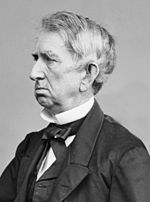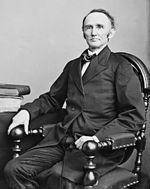 |
| (left to right) Edwin Stanton, Salmon Portland Chase, Abraham Lincoln, Gideon Welles, Caleb Blood Smith, William Henry Seward, Montgomery Blair, and Edward Bates |
After his inauguration, Lincoln appointed his Cabinet, which were approved by the Senate as the Constitution requires. He did not choose men that completely aligned with him – several of them had contended for the Republican presidential nomination. During Lincoln's administration he would have disagreements with his cabinet over important decisions. One historian noted "No President ever had a Cabinet of which the members were so independent, had so large individual followings, and were so inharmonious..."1 We will continue and look at each of the men he chose at the start of his term in more detail.
William H. Seward - Secretary of State
Seward was a lawyer and politician from New York. He and his wife were firm abolitionists and they helped hide fugitive slaves in disobedience to the Constitution saying that, "there is a higher law than the Constitution." He was governor of New York and a U.S. Senator. He was one of the prominent leaders of the new Republican party, and expected to receive the nomination for president. He was appointed Secretary of State by Lincoln and remained in that position through the presidencies of Lincoln and Andrew Johnson.Simon Cameron - Secretary of War
Cameron was orphaned at nine, but worked his was up in the printing, railroads and banking industries. He was nominated for president, but supported Lincoln in exchange for the appointment as Secretary of War, an important position in view of the impending troubles with the South. He resigned quickly due to corruption, which we will deal with at the proper time.Salmon P. Chase - Secretary of the Treasury
Chase was a lawyer and governor of Ohio. He was outspoken against slavery, and opposed its spread and compromise with the South. After Seward, he was one of the leaders in founding the Republican party to oppose slavery. He was a representative of the radical republicans and was working to run for president in 1864. He caused Lincoln much trouble until he was able to dispense with him. One of his duties of the treasury was to institute the system of paper money to finance the war, which is in opposition to the U.S. Constitution's requirement of gold and silver currency.Edward Bates - Attorney General
Bates was a politician from Missouri, and had written the preamble to the Constitution of that state. However he opposed slavery and was another of the candidates for the Republican nomination. He resigned in 1864 after disagreements with Lincoln.Montgomery Blair - Postmaster General
Blair was a lawyer from Maryland who had participated in several important cases. He was a founder of the Republican party and had campaigned for Lincoln. Lincoln appointed him Postmaster General and expected him to balance against the radicals. In 1864 he left the cabinet to conciliate the radical Republicans.Gideon Welles - Secretary of the Navy
Welles was a Republican supporter of Lincoln and was appointed as a cabinet member from New England. He disagreed with the blockade of the Southern ports, but after he was overruled he successfully built up the navy and contributed greatly to the defeat of the South. As a member of the cabinet he frequently clashed with the more radical members .Caleb B. Smith - Secretary of the Interior
Smith helped Lincoln secure the nomination for president, and was rewarded by his cabinet appointment. He disliked the job and resigned after his disagreement over the Emancipation Proclamation in 1864.1. Rufus Rockwell Wilson, editor, Intimate Memories of Lincoln, p. 503 (from Chauncey M. Depew, My Memories of Eighty Years).









0 comments:
Post a Comment